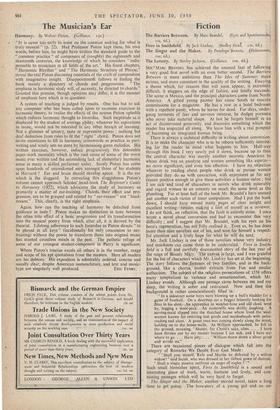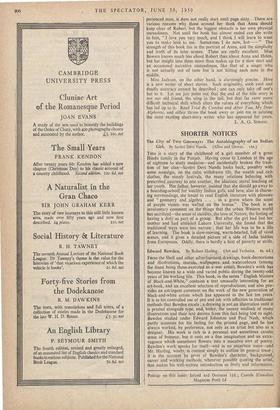The Lottery. By Shirley Jackson. (Gollancz, los. 6d.) MR. 4 MARC
BRANDEL has achieved the unusual feat of following a very good first novel with an even better second. The Barriers Between is more ambitious than The Ides of Summer, more serious, and more consistent in the quality of the writing Essaying a theme which, for reasons that will soon appear, is ,extremely difficult, it staggers on the edge of failure, and finally succeeds. The scene is Mexico, and the principal characters come from North America. A gifted young painter has come South to execute commissions for a magazine. He has a row in a hotel bedroom with a repellent paniy, whom he leaves for dead. For days, under- going torments of fear and nervous remorse, he dodges pursuers who never take material shape. At last he forgets himself in an act of disinterested generosity, and discovers something which the reader has suspected all along. We leave him with a real prospect of becoming an integrated human being. There is always a technical difficulty in writing about conversion. It is to n-take the character who is to be reborn sufficiently interest- ing for the reader to 'mind what happens to him. Half-way through this book I very nearly put it down, because up to then the central character was merely another neurotic American to whom drink was an anodyne and women something like aspirin— no more significant, and even less effective. I have no objection whatever to reading about people who drink or pursue women provided they do so with conviction, with enjoyment or for any reason positive enough to give these activities a human value ; but I am sick and tired of characters in novels who drink miserably and regard women as an amenity on much the same level as the plumbing. For at least half of the book Mr. Brandel's hero seemed just another such victim of inner compulsion. Had I put the book down, I should have missed many pages of clear insight and excellent writing—besides making a fool of myself as a reviewer. I do not think, on reflection, that the fault is entirely mine. I once wrote a novel about conversion and had to encounter this very difficulty ; and I suggest that Mr. Brandel, with his eyes on his hero's regeneration, has not fully realised it. Even so, he has done more than nine novelists out of ten, and won kir himself a respect- ful attention and a lively hope for what he will do next. Mr. Jack Lindsay is one of those novelists whose very industry and steadiness can cause them 'to be underrated. Fires in Smith- field is a full and carefully documented story of the last year of the reign of Bloody Mary. The canvas is' large, and I was grateful for the list of characteri which Mr. Lindtay has set at the beginning. The story follows the,fortunes of two families, and in the back- ground, like a chorus, mutter extracts from Fox and similar authorities. The subject of the religious persecutions of 1.558 offers many temptations to violence and sensationalism, which Mr. Lindsay avoids. Although one passage came between me, and my sleep,, the writing is sober and testrained. Now and then the background is rather conscientiously filled' in : " In a sidestreet some boys were blowing up a bull's bladder for a game of football. On a doorStep sat a beggar leisurely looking for fleas in his shirt. An apprentice in watchet-hose and old cloak went by, lugging a wool-pack. An oysterwife was shrilly laughing. A serving-maid slipped into the thatched house where lived the wis6- woman known for restoring lost goods and maidenheads with palm- reading and alum. A gaunt man was coming slowly along the Street, holding on to the house-walls, As William approached, he fell to the -ground, moaning, ' Master, for Chris 's sake, alms. . . . I have been thrown out by my -master because I am sick, and I have no
where to go.... Have pity: ' William threw down a silver groat and strode on."
There are occasional pieces of dialogue which fall into the category of Remarks We Doubt Ever Got Made: "'Shall you, myself, Rafe and.Martin be defeated by a witless widow? ' said Jacint, who was dressed in 'her richest gown of damask. " Shall a single pismire outfront an anger df eagles ? '"
Such small blemishes apart, Fires in Smithfield is a sound and interesting piece of work, warm, humane and lively, and con- taining passages which will be very hard to forget. The Singer and the Maker, another second novel, takes a long time to get going. The love-story of a young girl and an ex- perienced man, it does not really start until page sixty. There are various reasons why those around her think that Anna should keep clear of Robert, but the biggest obstacle is her own physical unreadiness. Not until the book has almost ended can she write to him, " I love you very much, and I think I will learn to want you to make love to me. Sometimes I do now,' but—" The strength of this book lies in the portrait of Anna, and the simplicity and truth of its later scenes. These are really excellent. Miss Bowers knows much less about Robert than about Anna and Helen, but her insight into them more than makes up for a: slow start and an occasional narrative unsteadiness, like that of a singer who is not actually out of tune but is not hitting each note in the middle.
Miss Jackson, on the other hand, is alarmingly precise. Here is a new writer of short stories. Such originality, such cool and deadly accuracy cannot be described ; one can only take off one's hat to it. Let me just point out that the end of the title story is not our old friend, the sting in the tail, but that far rarer more difficult technical shift which alters the values of everything which has led up to it. Read Trial By Combat and After You, My Dear Alphonse, and either throw the book away or join me in saluting the most exciting short-story writer who has appeared for years.
L. A. G. STRONG.















































 Previous page
Previous page